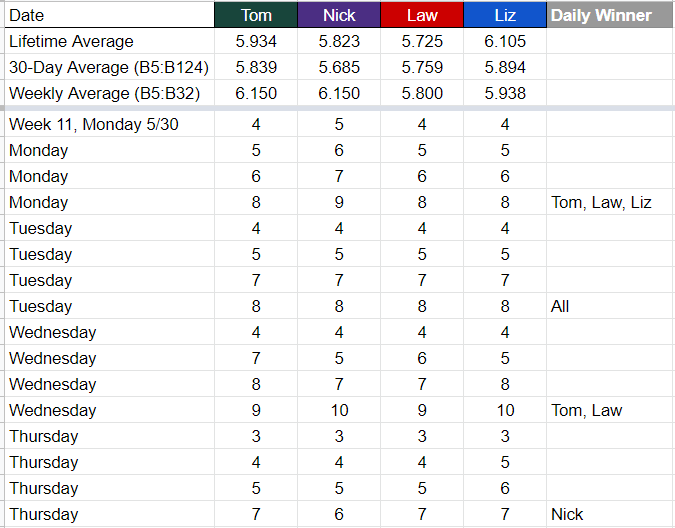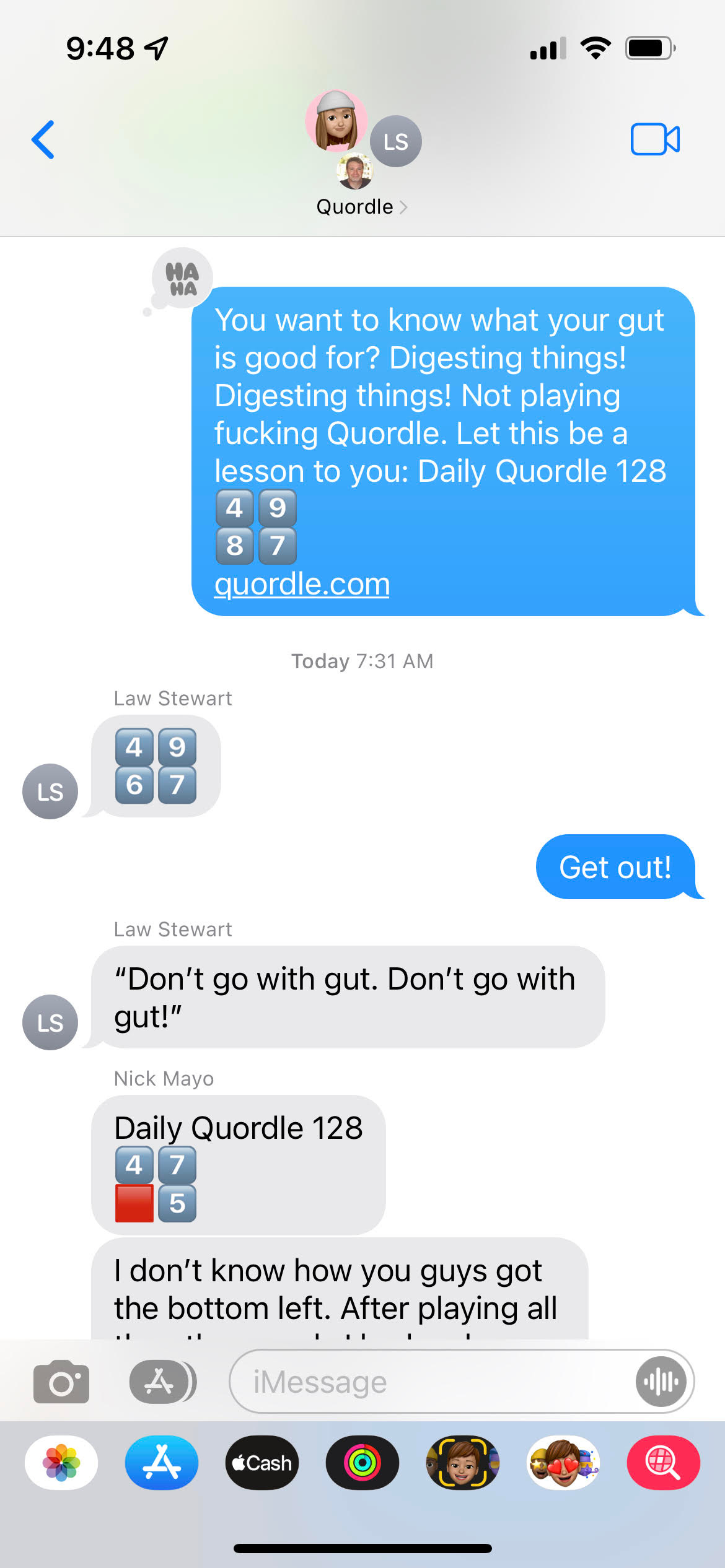I’m pretty deep into Wordle at this point—deep as in, it’s absolutely a daily habit, usually played as I start my second cup of coffee in the morning. Like many, I started playing on January 3, the day I read the NY Times article that introduced the game to the masses. That means that as of the day I wrote this, I’m on game #349. (Oh, and I’ve written about Wordle before here and here.)
Frankly, I’m getting a little bored.
I’ve been through all the stages of Wordle: the early days of discovery, the attempt to develop a system of flush words to guarantee the lowest possible scores (and the guarded protecting of those words, so as not to give up my “secret”), the quest to keep a streak going (mine ended at 84), calculating my average.
Along the way I “perfected” my flush-word strategy—and then got bored with it (how many times can I type the word TASER after all), abandoning it in favor of randomly selecting the first word that came to me in the morning (leading me to sometimes start with silly choices like ZILCH and ALLOW). Sara laughs when I tell her this: she’d always just chosen the first word that came to her, and thought I was boring for always starting with the same word.
And I shared, oh how I shared! I shared with my wife, I shared with my mom, I shared with friends, hell, I joined a Facebook group where perfect strangers shared their daily scores.
Sharing has its problems, of course. One friend was insufferable, insisting that he was brilliant (not lucky) when he scored a 2 or 3. The Facebook group felt pointless—I quickly realized that on any day, all scores were possible, and why bother sharing with strangers anyway?
So I retreated from that level of sharing. I quickly realized that I really only wanted to share with people who 1) played Wordle in a spirit of happiness and acceptance (no trash talk, no bragging) and 2) shared my basic premise that this was all just for fun.
At some point, I began to get bored: bored with getting a 4 the majority of the time (after game #342, my lifetime average was exactly 4); bored with winning 99% of the time; bored with sharing. Yeah, switching up some of the variables helped: going to the random start word, turning on hard mode (which impacted my average score not at all).
I tried all the variations on Wordle that have come along to ride the wave: Nerdle (too mathy), Framed (too filmy), Worldle (too mappy), etc. The only ones I still revisit regularly are Waffle, Duotrigordle (32 Wordles in one game!), and my favorite, Quordle: a grid of four Wordle games where you have a total of nine chances to get all four words.
Quordle Cures the Bordle
The solution to my boredom, as it turned out, was found in Quordle …
Quordle is just four linked Wordles, and thus I don’t think it would have sustained my interest very long if I was just playing and sharing, playing and sharing. Luckily one day my buddy Nick Mayo asked if I wanted to have a little competition, not just a daily share but a weekly compilation of our scores to see how we matched up over time. And thus began a whole new wrinkle in the word play.
First, we had to set it up in a shared spreadsheet—Google Sheets is just perfect for this and god knows Nick and I both love a good spreadsheet. Then, every day, we messaged each other with our score and then entered it in the sheet. At the end of the week, we had tied on the daily wins (calculated by the lowest number to complete the game, with 1 point to the winner and .5 points to a tie) and had to go to our tie-breaker (average of all guesses) to determine a winner. And thus the game was on.
In week 2, we had an outright tie—tied on points, tied on average—and were really enjoying the sharing and the banter, so we invited a couple more friends to join: Law Stewart and Liz Figurelli. And then it got even more fun. There’s the sharing fun: one player exulting when they got a 2 to start the game, another face-palming when they bashed out on a 10 (that’s the score you get for any game you don’t finish).
More than this, though, were the sustained conversations we started to have around strategy and style of play: we debated how many flush words you should start with (2 or 3); the “ethics” of sharing our flush words (we didn’t share for the longest time, but now do; see note below); the patience it took to play no word before it’s time (versus my own propensity to just play words so I could move on). Law quickly emerged as the most patient player; Nick as the most deliberate; Liz the most impulsive; and Tom the most impatient (or was it Tom impulsive and Liz impatient?). And yet we are all pretty damned close, all falling within .4 points (between at 5.7 and 6.1) on our lifetime average, and all of us improving over time (revealed by the difference in our lifetime average and our 30-day average).
The daily chatter was pleasant on its own terms. I marveled at our shared capacity to have playful, humorous competition. No one spiked the ball when they won for the day, nor did anyone sulk when they lost. What you saw over time was that you win some and you lose some, and I think we all have come to the point where watching how others play and discussing our approach is just a really satisfying diversion.
My own enjoyment was really aided by the data that we were gathering on our play over time. Together, the conversation and the data started me thinking about how we explain success in this game: is winning regularly the product of a better set of flush words, a better bank of words in one’s head, better pattern recognition, more discipline … (I’m not ignoring luck; luck is a big factor in individual games, but it gets ironed out over time.) What is it that constitutes skill in answering a series of five-letter word puzzles—and how does that relate to skill and acumen in general?
In the end, it’s not playing Quordle that’s kept me so engaged. It’s playing Quordle with friends, laughing at and debating our play, tracking our performance over time, talking about it over a beer or when we run into each other at the grocery store, and then considering—with humility and humor and caring—what it is to be friends and what it is to be human … that’s what’s kept me so engaged.
Nick agrees, noting: “If it weren't for the friendly competition, I'm not sure I would bother with the game on a regular basis. Sure, it might be fun to pick up once in a while, but it would quickly become a chore if not for the community of our fellow players. Playing with good friends provides an incentive to play and to play well, but if you get unlucky one day, there's always an encouraging word to soften the disappointment.”
If this sounds like fun to you and you’d be interested in joining this little Quordle circle, drop me a line and let me know. Although it’s scary to think about upsetting the lovely dynamic we’ve got going, we can easily add players to our existing scoresheet and we’ve set up the calculations so there’s no real “penalty” for joining late or not being able to participate weekly. You’ll just have to follow our “no jerks” rule.
I can also share a blank scoresheet so that you can start a little Quordle conversation of your own, if you prefer.
In closing, here are my somewhat tongue-in-cheek rules for winning at Wordle, Quordle, and their brethren. We’re running a test on rule #1 right now in our Quordle group, so I may modify soon.
How to Win at Wordle/Quordle
A simple guide to winning:
Use great “flush words”–two for sure, with a choice of third words contingent on how the first two play out.*
Make an informed guess as soon as possible to improve your average.
Play your next flush word if you’re stuck.
Don’t make unforced errors.
Be lucky.
*We are currently testing this out in our Quordle group by all starting with the same three flush words, which we think may reveal whether there is acumen beyond the choice of flush words. Stay tuned!





Very well articulated Tom - if I wasn't already part of the Quordle group I'd definitely sign up! ;)
I'm not quite there yet. Wordle still challenges me to some degree. I have adopted the rotating the first word and dropping in a random one for fun occasionally.